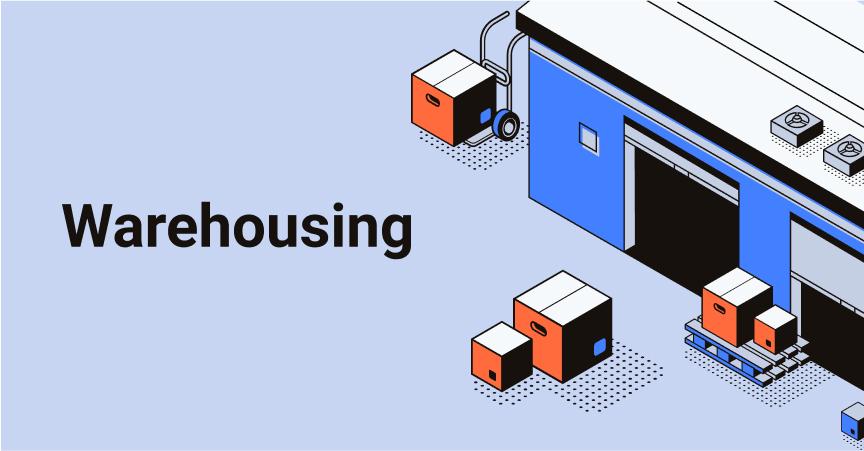Warehousing

Warehousing is a fundamental component of any supply chain. Warehousing management plays a critical role in everything from effectively overseeing inventory to ensuring timely order delivery. Whether you’re a retailer, wholesaler, or dropshipper, understanding warehousing and inventory management can significantly enhance your business operations.
What is warehousing?
Warehousing refers to the practice of storing physical goods before they are sold to customers or distributed to other destinations. It’s a cornerstone of warehousing and logistics, ensuring that products are safely stored and readily available when needed.
Brick-and-mortar stores often lack the space to stock all the goods they purchase from wholesalers. Additionally, retailers prefer buying products in smaller quantities, which means wholesalers must store most of their inventory in a warehouse until retailers request another shipment. This highlights the importance of warehousing in supply chain management, where the location of warehouses can significantly impact delivery speed and cost.
Warehousing services
A warehousing service provider is a business that offers substantial warehouse space for lease. Customers can rent as much space as they need for as long as required, ensuring their inventories are stored in secure, climate-controlled environments. These warehousing solutions are essential for businesses that need storage warehousing but don’t want to invest in their own facilities.
For businesses looking to outsource, 3PL warehousing (third-party logistics) offers a flexible and cost-effective option. These providers go beyond warehousing by offering warehousing and fulfillment services, which include picking, packing, and shipping orders directly to customers.
Types of warehousing solutions
- Private warehouse: Owned by private companies, including manufacturers, distributors, and retailers, this option provides full control over warehousing and storage, equipment security, and personnel.
- Public warehouse: These facilities are owned by government or semi-state entities and are leased to businesses.
- Distribution warehousing: Unlike standard warehouses, distribution centers focus on warehousing and distribution, aiming to ship goods as quickly and cost-effectively as possible. They are often located near transportation hubs.
- Fulfillment warehousing: These facilities specialize in warehousing and fulfillment, handling everything from storage to order processing and delivery.
The role of technology in warehousing
Modern warehousing software and data warehousing tools have revolutionized the industry. Smart warehousing leverages automation and data analytics to optimize storage, reduce costs, and improve efficiency. Additionally, data warehousing solutions and data warehousing concepts are transforming how businesses manage and analyze their inventory data.
What is data warehousing? It’s a system for collecting, storing, and analyzing large volumes of data to support decision-making. When combined with data warehousing and business intelligence, businesses can gain valuable insights into their operations and customer behavior.
Warehousing and dropshipping
At first glance, warehousing might seem irrelevant to dropshipping, as entrepreneurs don’t store products themselves. However, dropshipped goods still come from suppliers, and their warehousing logistics can impact delivery times. For example, if a supplier’s warehouse is far from the customer’s location, delivery times will increase. This is why many dropshippers choose suppliers with interstate warehousing or facilities in key regions like Europe or the US.
Optimizing warehouse operations
- Warehouse layout and design: A well-designed warehouse layout can significantly improve efficiency. Key considerations include optimizing storage space, ensuring easy access to high-demand items, and minimizing travel time for workers.
- Inventory tracking systems: Advanced systems like RFID (Radio Frequency Identification) and barcode scanning help businesses track inventory in real-time, reducing errors and improving accuracy.
- Safety and compliance: Warehouses must adhere to safety regulations to protect workers and goods. This includes proper fire safety measures, ergonomic equipment, and regular inspections.
- Sustainability: Many warehouses are adopting eco-friendly practices, such as using energy-efficient lighting, recycling materials, and reducing waste.
- Cross-docking: This logistics practice involves unloading goods from incoming vehicles and loading them directly onto outbound vehicles, reducing the need for storage and speeding up delivery times.
- Seasonal warehousing: Businesses with fluctuating demand, such as those in retail, often use seasonal warehousing to handle peak periods like holidays or sales events.
- Cold storage warehousing: For perishable goods like food and pharmaceuticals, cold storage warehouses maintain specific temperature and humidity levels to preserve product quality.
- Automation and robotics: Automated systems and robotics are increasingly used in warehouses for tasks like picking, packing, and sorting, improving speed and reducing labor costs.
- Reverse logistics: Warehouses also handle returns and defective products, ensuring they are processed efficiently and either restocked, repaired, or disposed of properly.
- Global warehousing: For businesses operating internationally, global warehousing networks ensure products are stored closer to customers, reducing shipping costs and delivery times.
Why warehousing matters
From logistics warehousing to distribution warehousing, these facilities are essential for maintaining a smooth supply chain. Whether you’re using warehousing 3PL services or managing your own storage warehousing, the right warehousing solutions can help you reduce costs, improve efficiency, and enhance customer satisfaction.











